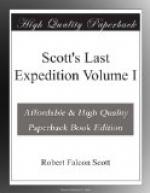Discussed with Wright the fact that the hummocks on sea ice always yield fresh water. We agreed that the brine must simply run down out of the ice. It will be interesting to bring up a piece of sea ice and watch this process. But the fact itself is interesting as showing that the process producing the hummock is really producing fresh water. It may also be noted as phenomenon which makes all the difference to the ice navigator._5_
Truly the getting to our winter quarters is no light task; at first the gales and heavy seas, and now this continuous fight with the pack ice.
8 P.M.—We are getting on with much bumping and occasional ‘hold ups.’
Tuesday, December 13.—I was up most of the night. Never have I experienced such rapid and complete changes of prospect. Cheetham in the last dog watch was running the ship through sludgy new ice, making with all sail set four or five knots. Bruce, in the first, took over as we got into heavy ice again; but after a severe tussle got through into better conditions. The ice of yesterday loose with sludgy thin floes between. The middle watch found us making for an open lead, the ice around hard and heavy. We got through, and by sticking to the open water and then to some recently frozen pools made good progress. At the end of the middle watch trouble began again, and during this and the first part of the morning we were wrestling with the worst conditions we have met. Heavy hummocked bay ice, the floes standing 7 or 8 feet out of water, and very deep below. It was just such ice as we encountered at King Edward’s Land in the Discovery. I have never seen anything more formidable. The last part of the morning watch was spent in a long recently frozen lead or pool, and the ship went well ahead again.
These changes sound tame enough, but they are a great strain on one’s nerves—one is for ever wondering whether one has done right in trying to come down so far east, and having regard to coal, what ought to be done under the circumstances.
In the first watch came many alterations of opinion; time and again it looks as though we ought to stop when it seemed futile to be pushing and pushing without result; then would come a stretch of easy going and the impression that all was going very well with us. The fact of the matter is, it is difficult not to imagine the conditions in which one finds oneself to be more extensive than they are. It is wearing to have to face new conditions every hour. This morning we met at breakfast in great spirits; the ship has been boring along well for two hours, then Cheetham suddenly ran her into a belt of the worst and we were held up immediately. We can push back again, I think, but meanwhile we have taken advantage of the conditions to water ship. These big floes are very handy for that purpose at any rate. Rennick got a sounding 2124 fathoms, similar bottom including volcanic lava.




